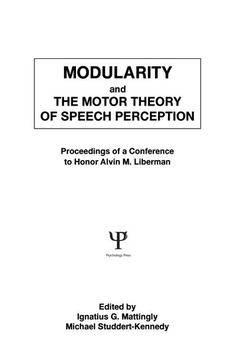Description
Modularity and the Motor theory of Speech Perception
Proceedings of A Conference To Honor Alvin M. Liberman
Coordinators: Studdert-Kennedy Michael, Mattingly Ignatius G.
Language: English
Subjects for Modularity and the Motor theory of Speech Perception:
Keywords
phonetic; gestures; haskins; laboratories; vocal; tract; production; module; duplex; categorical; Speech Perception; FO; Phonetic Module; Phonetic Gestures; Duplex Perception; Phonetic Perception; Canonical Babbling; Vocal Folds; VOT; Phonetic Segments; Haskins Laboratories; Phonetic Categories; Basilar Membrane; Motor Theory; Vocal Motor Schemes; Garden Path Effect; Constriction Degree; Nonnative Contrasts; Gestural Overlap; Gestural Scores; Phonological Awareness; Playing Back; Monocular Deprivation; Language Module; ERP Data
· 15.6x23.4 cm · Paperback
Description
/li>Contents
/li>Readership
/li>Biography
/li>
A compilation of the proceedings of a conference held to honor Alvin M. Liberman for his outstanding contributions to research in speech perception, this volume deals with two closely related and controversial proposals for which Liberman and his colleagues at Haskins Laboratories have argued forcefully over the past 35 years. The first is that articulatory gestures are the units not only of speech production but also of speech perception; the second is that speech production and perception are not cognitive processes, but rather functions of a special mechanism. This book explores the implications of these proposals not only for speech production and speech perception, but for the neurophysiology of language, language acquisition, higher-level linguistic processing, the visual perception of phonetic gestures, the production and perception of sign language, the reading process, and learning to read. The contributors to this volume include linguists, psycholinguists, speech scientists, neurophysiologists, and ethologists. Liberman himself responds in the final chapter.
Contents: Preface. F.S. Cooper, Introduction: Speech Perception. B. Lindblom, The Status of Phonetic Gestures. O. Fujimura, Comment: Beyond the Segment. C.A. Fowler, L.D. Rosenblum, The Perception of Phonetic Gestures. P.F. MacNeilage, Comment: The Gesture as a Unit in Speech Perception Theories. M.M. Vihman, Ontogeny of Phonetic Gestures: Speech Production. M. Studdert-Kennedy, Comment: The Emergent Gesture. J. Werker, The Ontogeny of Speech Perception. P.D. Eimas, Comment: Some Effects of Language Acquisition on Speech Perception. Q. Summerfield, Visual Perception of Phonetic Gestures. J.L. Miller, Comment: Bimodal Speech Perception and the Motor Theory. H. Poizner, U. Bellugi, E.S. Klima, Brain Function for Language: Perspectives From Another Modality. H. Lane, Comment: Dr. Harlan and Mr. Lane. J.C. Catford, P.W. Jusczyk, D.H. Klatt, A.M. Liberman, R.E. Remez, K.N. Stevens, Panel Discussion: The Motor Theory and Alternative Accounts. A.S. Bregman, The Compositional Process in Cognition With Applications to Speech Perception. D.B. Pisoni, Comment: Modes of Processing Speech and Nonspeech Signals. C.J. Darwin, The Relationship Between Speech Perception and the Perception of Other Sounds. B.H. Repp, Comment: Around Duplex Perception. H.J. Neville, Whence the Specialization of the Language Hemisphere? M. Konishi, Neural Mechanisms of Binaural Fusion. C. Browman, L. Goldstein, Gestural Structures: Distinctiveness, Phonological Processes, and Historical Change. I.G. Mattingly, Reading and the Biological Function of Linguistic Representations. D. Holender, Comment: Writing Systems and the Modularity of Language. U. Bellugi, S. Blumstein, J. Fodor, V. Mann, A. Samuel, Panel Discussion: The Modularity of Speech and Language. S. Crain, D. Shankweiler, Modularity and Learning to Read. P. Bertelson, B. de Gelder, The Emergence of Phonological Awareness: Comparative Approaches. E.S. Klima, Comment: Linguistic Awareness and Metalinguistic Control. J. Fodor, L. Frazier, M. Garrett, P. Gorrell, J. Mehler, Panel Discussion: Sentence Perception and Sentence Production. J.J. Jenkins, Summary of the Conference: Speech is Special. A.M. Liberman, Afterthoughts on Modularity and the Motor Theory.




